International Student and Scholar Advising, 10/9
Category : GLEPI News/Events
Join Matt Davidson international student advising on Wednesday October 9 at 1pm.

News, updates, and information for current students and alumni of the Department of Epidemiology at Rollins School of Public Health
Category : GLEPI News/Events
Join Matt Davidson international student advising on Wednesday October 9 at 1pm.

Category : GLEPI News/Events
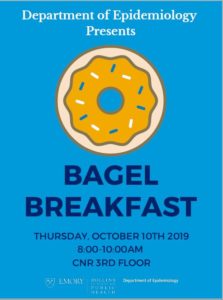
The Epidemiology Department will be holding Bagel Breakfast Thursday, October 10th from 8am-10am.
Category : GLEPI Student Opportunities
The Center for Global Data Visualization (CGDV) invites you to join an international data visualization hackathon! In this hackathon, we will provide you with data sets and the opportunity to visualize global, regional or country specific data related to refugees and displaced populations. You will have the opportunity to perform exploratory analysis and provide insights that can have a real impact to help refugees. Prizes will be provided for the winning visuals, and you can Register here to sign up. The Hackathon will take place from October 19 through the 26th.
Category : GLEPI News/Events
Are you a GLEPI student looking for news, events, and opportunities specifically related to global health? Now, these posts will be collected under the GLEPI menu item for extra quick access! Simply hover over the Student Opportunities menu, and click GLEPI in the dropdown.
Let us know what you think!
Category : GLEPI News/Events
On Thursday, October 17, two of Rollins alumni will be returning to campus to speak at Pathways to Public Health. Alexa Morse is a 2017 BSHE graduate and currently working at the Global Center for Medical Innovation. Liz Hannapel is a 2012 EPI alumna and works with the GA Department of Public Health. Come hear about their pathway to public health and explore a variety of career options!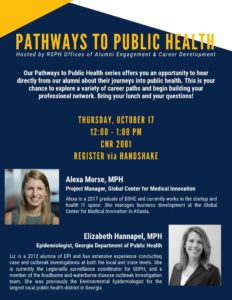
Category : GLEPI Student Opportunities
Bring your lunch and learn about a funding opportunity to support field work in low- and middle- income countries!
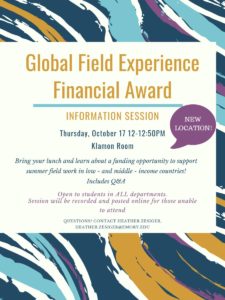
Category : GLEPI News/Events
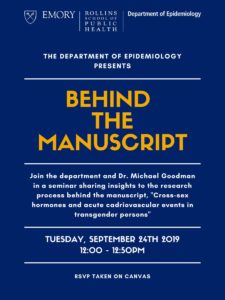
Join the Epidemiology department and Dr. Michael Goodman in a seminar sharing the insights to the research process behind the manuscript “Cross-sex hormones and acute cardiovascular events in transgender persons”
Please RSVP by clicking HERE.
Category : GLEPI News/Events
Join the Epidemiology Department for pizza and a conversation with peers and Dr. Timothy Lash and Dr. Lauren Christiansen-Lindquist on 10/2 at 12 pm. Please RSVP whether you plan to attend or not by clicking HERE.
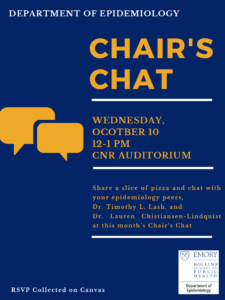
Category : GLEPI Student Opportunities
The Task Force for Global Health is offering a fellowship opportunity to a Hilton Prize Coalition (HPC) Fellow starting in September 2019 for a minimum of three months part-time.
The HPC Fellow will have an opportunity to:
• Work as part of an ongoing Task Force program
• Become acquainted with TEPHINET’s operations and strategic work areas
• Interact with technical experts in field epidemiology and learning, and public health leaders
• Become familiar with working with coalitions and collaborative concepts
• Assist in advancing a new priority work area for the program
• Otherwise contribute to strengthen technical capacity at TEPHINET
TASK FORCE BACKGROUND:
The Task Force for Global Health is an Emory University affiliate located in Decatur, GA. Its programs focus on building robust public health systems that serve all people. Program areas include neglected tropical diseases, vaccines, and health systems strengthening. The Task Force for Global Health was recognized for its extraordinary contributions to alleviating human suffering with the 2016 Conrad N. Hilton Humanitarian Prize, the world’s largest award of its kind. The Task Force is ranked among the largest nonprofits in the United States due to in-kind contributions of medicines and vaccines from major pharmaceutical companies valued at billions of dollars annually.
TEPHINET BACKGROUND:
Training Programs in Epidemiology & Public Health Interventions Network (TEPHINET) is a global network of field epidemiology training programs (FETPs) founded in June 1997 with support from the World Health Organization (WHO), Centers for Disease Control and Prevention (CDC), and the Foundation Merieux. With a secretariat based in Atlanta, Georgia, USA, TEPHINET is the only global network of field epidemiology training programs, spanning multiple regional networks, sub-regional programs, and national programs around the world. Overall, TEPHINET comprises 71 programs in more than 100 countries. Currently, there are more than 12,000 FETP graduates around the world. For more information, visit TEPHINET’s website: https://www.tephinet.org/.
PROJECT:
The HPC Fellow will support TEPHINET in creating and implementing a continuous learning strategy as it relates to their mission goals. TEPHINET’s vision for the learning strategy is to:
1. Create a robust and sustainable learning platform able to host educational resources and training materials relevant to the global FETP community 2. Strengthen TEPHINET’s learning support, coordination, and interaction role to amplify the effectiveness of field epidemiologists within the network 3. Generate both internal and external (e.g., academic and research institutions) opportunities for collaboration and knowledge exchange
FELLOW ACTIVITIES AND OPPORTUNITIES:
The HPC Fellow will focus primarily on supporting technical aspects of TEPHINET as it pertains to two of its strategic work areas: continuous learning and knowledge exchange. These include:
• Convening meetings of technical experts to discuss current learning gaps and emergent needs and compiling inputs for inclusion into a draft strategy document
• Performing targeted collaborative strategic activities with knowledge exchange and learning teams
The fellow will primarily be supporting TEPHINET learning activities, such as, but not limited to:
• FETP Learning Advisory Council coordination and development activities
• Learning Strategy creation and validation
• Other priority learning activities that result from the above two tasks
This position will focus primarily on supporting continued implementation of Objectives 1 and 2, and to a lesser degree Objectives 3 and 4, from the TEPHINET Learning Strategy Development and Implementation initiative:
• Objective 1: Formalize the creation of a network-wide learning advisory board


• Objective 2: TEPHINET Learning Strategy is finalized and validated by the learning advisory board (FLAC), FETP Program Directors, and other key stakeholders Activities:

• Liaison with a strategy development SME contractor to have a first draft of the strategy ready for presentation to the Program Directors in late October 2019

• Objective 3: By 31 August 2020, select new Learning Management System (LMS) for the TEPHINET Secretariat to manage and share with the global network.

• Objective 4: Starting in May 2020 through 31 August 2020, begin dissemination and implementation of TEPHINET Continuous Learning Strategy (TEPHINET will be concurrently working on some priority activities while developing the strategy.)

OTHER RESPONSIBILITIES:
• Participates fully as a member of the Task Force for Global Health and TEPHINET by contributing, assisting and participating in projects, activities, and initiatives as requested by management.
• Complete a Disaster Ready training administered by Hilton.
The fellowship will provide compensation to the fellow in the form of a $5,000 stipend paid on a bi-weekly basis.
APPLICATION REQUIREMENTS:
Fellowship applicants should meet the following qualifications:
• Be enrolled in a master’s degree program in public health with a focus in epidemiology, global health, or a learning-focused degree or concentration OR have demonstrable experience (2-5 years or 5+ years) with learning related initiatives, ideally learning activity cycle beginning to end (design to evaluation) and/or strategy development and action planning
• Experience with development/management of virtual collaboration technology tools
• Be familiar with data management, survey development and basic data analysis
• Have an interest in strengthening public health capacity
THE APPLICATION SHOULD INCLUDE THE FOLLOWING MATERIALS:
• A cover letter stating the applicant’s area of interest in public health that includes an overview or summary of related projects, experiences, or publications produced by the applicant (maximum one page)
To apply, click HERE.
Category : GLEPI Student Opportunities
BACKGROUND
The MSF Khayelitsha project provides support to HIV, TB, and DR TB programmes being run by local government in the sub-district. Part of this support involves piloting innovative strategies to promote virologic suppression, long term retention in care, and support for high risk groups of HIV positive patients. The HIV data team is responsible for data collection, monitoring, evaluation, and supporting operational research around MSF Khayelitsha project’s HIV-related pilots. The aim is to disseminate key findings and advocacy messages through conferences, publications, and interactions with the local and national Department of Health.
The epidemiologist intern will report to Dr. Ingrid Katz (Harvard Medical School, Harvard Global Health Institute), Dr. Bethany Hedt-Gauthier (Harvard Medical School), and the HIV epidemiologist of MSF Khayelitsha. The epidemiologist intern will be part of a team that includes two medical data processing officers, a data supervisor, and the HIV epidemiologist. They will work be required to work closely with all data team members, and cooperate with all other staff in the Khayelitsha office. This unpaid internship would provide academic opportunities, including mentorship for Masters and Doctoral-level students and potential publication opportunities.
TASKS AND RESPONSIBILITIES
The HIV epidemiologist will work with the intern epidemiologist to devise a work plan that balances the development of the intern epidemiologist and their contribution to the project. This could involve delegation of entire pilots to the intern epidemiologist or a focus on specific types of tasks.
Monitoring and evaluation (M&E)
The epidemiologist intern will assist the HIV epidemiologist with the organization, data management, and quarterly reporting of the M&E of MSF pilot projects, specifically: Outreach Initiation Model, 6-months ARV supply study, PrEP, Postnatal Clubs and a ‘Welcome back services’. This may include development and maintenance of M&E tools for new and ongoing projects, and ad hoc data requests to inform ongoing or planned pilots. Where appropriate, they will also support the capacity building of the data team staff.
Operational research
The intern epidemiologist will be involved in all stages of operational research. This includes:
· Maintenance of an MSF Khayelitsha HIV operational research agenda
· Development of study protocols and analysis plans
· Ethics submissions (new, routine reporting, amendments) to both University of Cape Town Human Research Ethics Committee, and MSF’s Ethics Review Board
· Interim data analyses
· Preparation of conference submissions and potentially manuscripts for journals.
· The intern epidemiologist may have opportunities to get involved in other analyses as capacity allows.
POSITION REQUIREMENTS
Required qualifications and skills
· Masters in Public Health or MSc Epidemiology, or other related masters in a scientific discipline
· Experience in data cleaning, management and analysis
· Previous training and experience using Stata software.
· Previous experience of data collection software, e.g. REDCap (preferred) or mobile data collection
The ideal candidate would be flexible and willing to adapt to team needs. They should have an interest in improving the health outcomes of people living with HIV, and be committed to balancing research integrity and pragmatic implementation needs.
Recent Comments